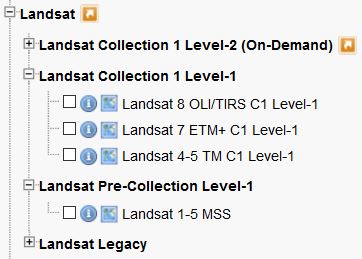I am working on a project comparing each pixel every 4 years for the same AOI from Landsat Images (1986-2017). It involves with Landsat 5, 7 and 8 images. Do I need to perform image registration as image preparation? I am using only RGB and NIR bands all data has the same spatial resolution (30 m). I am using higher level data (level 2). Can somebody explain why it is necessary or not?
1 Answer
Using Collection 1 is not necessary:
In 2016, the USGS reorganized the Landsat archive into a tiered collection. This structure ensures that Landsat Level-1 products provide a consistent archive of known data quality to support time-series analyses and data “stacking”, while controlling continuous improvement of the archive and access to all data as they are acquired.
So use Collection 1 Level-2 scenes:
-
Why would you use Level-2 instead of Level-1? Aren't they scenes with larger uncertainties, or did I misinterpret that? Also, @OguzSariyildiz you need to accept the answer if it answers your question.– JonCommented May 15, 2018 at 20:25
-
@Jon I agree, but is part of the question -I am using higher level data (level 2)- Commented May 15, 2018 at 20:30
-
@Jon 2 Level-2 images are corrected atmospherically (or surface reflectance). It helps with accuracy of the values in temporal vegetation analysis (NDVI). Thank you for your comments and info!– AmadeusCommented May 15, 2018 at 23:17
-
@OguzSariyildiz for NDVI times series, I would prefer to use a radiometric normalization using invariant pixels over NDVI TOA values Commented May 16, 2018 at 1:54
-
@aldo_tapia Why do you think radiometric normalization using invariant pixels better than NDVI TOA values?– AmadeusCommented May 16, 2018 at 3:34

